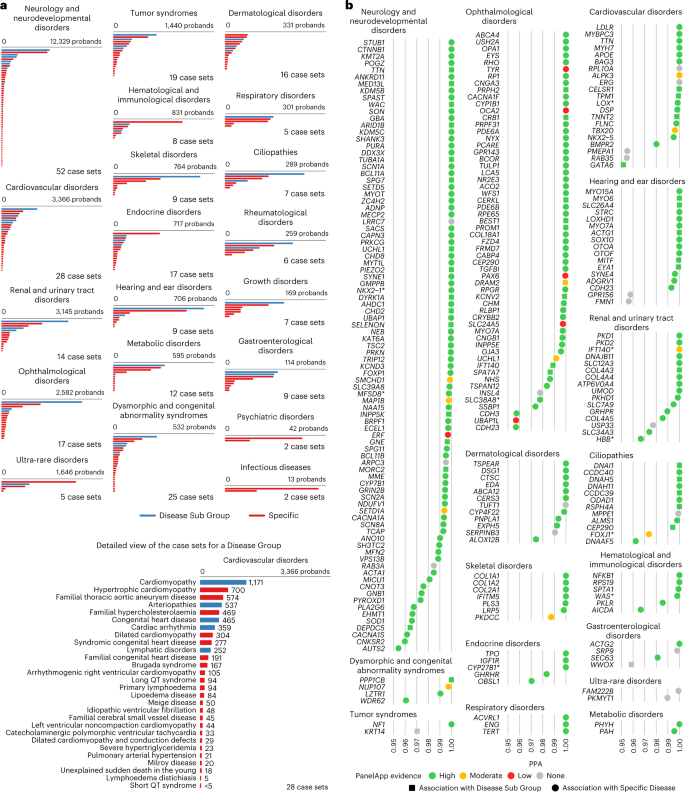2023-03-17 インペリアル・カレッジ・ロンドン(ICL)
これにより、まれな疾患の遺伝原因を発見することが可能になり、リンパ浮腫、胸部大動脈瘤症、先天性難聴の遺伝原因の発見につながった。原発性リンパ浮腫の約40%は、特定の遺伝原因があるが、多くの患者の遺伝原因は未知である。この研究では、ERG遺伝子の変異が原発性リンパ浮腫と心血管疾患との関連性を示したため、今後の治療に大きな影響を与える可能性がある。
<関連情報>
- https://www.imperial.ac.uk/news/243811/genetic-causes-three-previously-unexplained-rare/
- https://www.nature.com/articles/s41591-023-02211-z
77,539ゲノムの遺伝子関連解析により、希少疾患の病因が判明 Genetic association analysis of 77,539 genomes reveals rare disease etiologies
Daniel Greene,Genomics England Research Consortium,Daniela Pirri,Karen Frudd,Ege Sackey,Mohammed Al-Owain,Arnaud P. J. Giese,Khushnooda Ramzan,Sehar Riaz,Itaru Yamanaka,Nele Boeckx,Chantal Thys,Bruce D. Gelb,Paul Brennan,Verity Hartill,Julie Harvengt,Tomoki Kosho,Sahar Mansour,Mitsuo Masuno,Takako Ohata,Helen Stewart,Khalid Taibah,Claire L. S. Turner,Faiqa Imtiaz,Saima Riazuddin,Takayuki Morisaki,Pia Ostergaard,Bart L. Loeys,Hiroko Morisaki,Zubair M. Ahmed,Graeme M. Birdsey,Kathleen Freson,Andrew Mumford & Ernest Turro
Nature Medicine Published:16 March 2023
DOI:https://doi.org/10.1038/s41591-023-02211-z

Abstract
The genetic etiologies of more than half of rare diseases remain unknown. Standardized genome sequencing and phenotyping of large patient cohorts provide an opportunity for discovering the unknown etiologies, but this depends on efficient and powerful analytical methods. We built a compact database, the ‘Rareservoir’, containing the rare variant genotypes and phenotypes of 77,539 participants sequenced by the 100,000 Genomes Project. We then used the Bayesian genetic association method BeviMed to infer associations between genes and each of 269 rare disease classes assigned by clinicians to the participants. We identified 241 known and 19 previously unidentified associations. We validated associations with ERG, PMEPA1 and GPR156 by searching for pedigrees in other cohorts and using bioinformatic and experimental approaches. We provide evidence that (1) loss-of-function variants in the Erythroblast Transformation Specific (ETS)-family transcription factor encoding gene ERG lead to primary lymphoedema, (2) truncating variants in the last exon of transforming growth factor-β regulator PMEPA1 result in Loeys–Dietz syndrome and (3) loss-of-function variants in GPR156 give rise to recessive congenital hearing impairment. The Rareservoir provides a lightweight, flexible and portable system for synthesizing the genetic and phenotypic data required to study rare disease cohorts with tens of thousands of participants.


